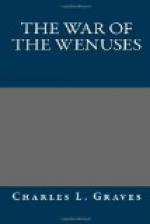“Ulat tanalareezul Savourneen Dheelish tradioun marexil Vi-Koko for the hair. I want yer, ma honey.”
The effect was nothing short of magical. The rhythmic exhalations ceased instanteously, and the tallest and most fluorescent of the Wenuses, laying aside her Red Weed, replied in a low voice thrilling with kinetic emotion:
“Phreata mou sas agapo!”
The sentiment of these remarks was unmistakable, though to my shame I confess I was unable to fathom their meaning, and I was on the point of opening the scullery door and rushing out to declare myself, when I heard a loud banging from the front of the house.
I stumbled up the kitchen stairs, hampered considerably by my wife’s skirt; and, by the time I had reached the hall, recognised the raucous accents of Professor Tibbles, the Classical Examiner, shouting in excited tones:
“Let me in, let me in!”
I opened the door as far as it would go without unfastening the chain, and the Professor at once thrust in his head, remaining jammed in the aperture.
“Let me in!” he shouted. “I’m the only man in London besides yourself that hasn’t been pulped by the Mash-Glance.”
He then began to jabber lines from the classics, and examples from the Latin grammar.
A sudden thought occurred to me. Perhaps he might translate the observation of the Wenus. Should I use him as an interpreter? But a moment’s reflection served to convince me of the danger of such a plan. The Professor, already exacerbated by the study of the humanities, was in a state of acute erethism. I thought of the curate, and, maddened by the recollection of all I had suffered, drew the bread-knife from my waist-belt, and shouting, “Go to join your dead languages!” stabbed him up to the maker’s name in the semi-lunar ganglion. His head drooped, and he expired.
I stood petrified, staring at his glazing eyes; then, turning to make for the scullery, was confronted by the catastrophic apparition of the tallest Wenus gazing at me with reproachful eyes and extended tentacles. Disgust at my cruel act and horror at my extraordinary habiliments were written all too plainly in her seraphic lineaments. At least, so I thought. But it turned out to be otherwise; for the Wenus produced from behind her superlatively radiant form a lump of slate which she had extracted from the coal-box.
“Decepti estis, O Puteoli!” she said.
“I beg your pardon,” I replied; “but I fail to grasp your meaning.”
“She means,” said the Examiner, raising himself for another last effort, “that it is time you changed your coal merchant,” and so saying he died again.
I was thunderstruck: the Wenuses understood coals!
And then I ran; I could stand it no longer. The game was up, the cosmic game for which I had laboured so long and strenuously, and with one despairing yell of “Ulla! Ulla!” I unfastened the chain, and, leaping over the limp and prostrate form of the unhappy Tibbles, fled darkling down the deserted street.




